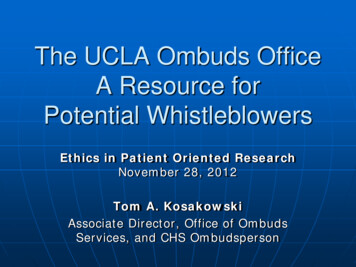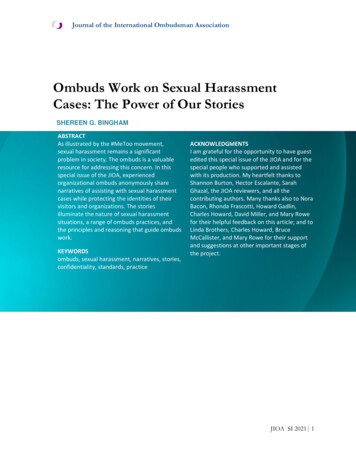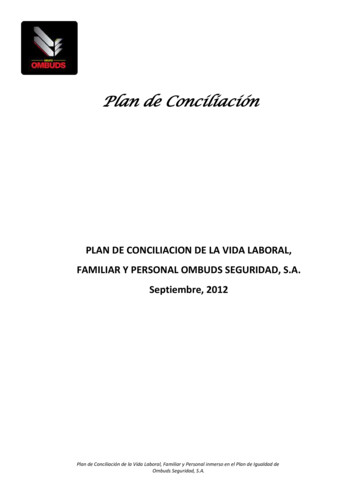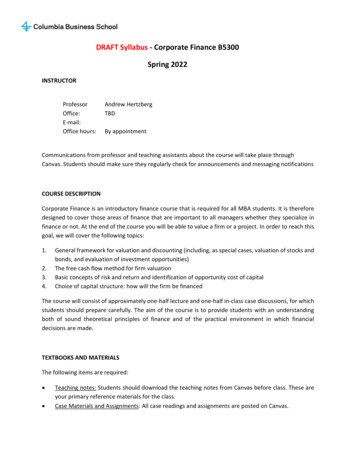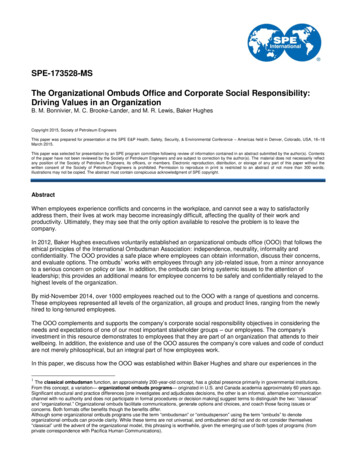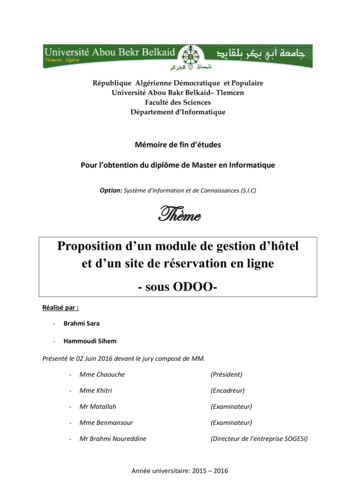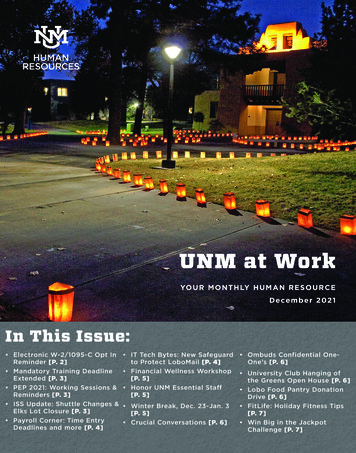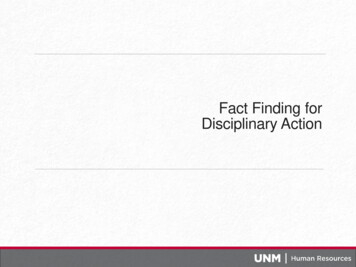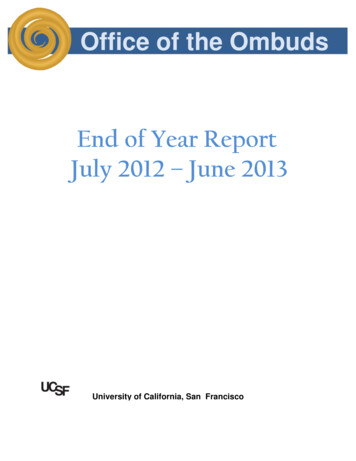
Transcription
Office of the OmbudsEnd of Year ReportJuly 2012 – June 2013University of California, San Francisco
Table of ContentsAcknowledgement2Office of the Ombuds Background3Office of the Ombuds Overview4Program Accomplishments8Case mmary24Glossary25Appendices261 Page
AcknowledgementThe Office of the Ombuds would like to thank Vice Provost for Academic Affairs SallyMarshall for her gracious support. Dr. Marshall, who retired June 30, 2013, was instrumentalin the establishment of the office. Her strong leadership skills have made a positive impact onmany programs vital to academic and professional experiences at UCSF, including the Officeof the Ombuds which offers a unique and critical service that is confidential, neutral,independent and informal. Dr. Marshall’s respect for the Standards of Practice of theInternational Ombuds Association has been of tremendous value to the office, and ultimately,to the UCSF community. We wish her well in her retirement!2 Page
Office of the Ombuds BackgroundUCSF is committed to fair policies and procedures and recognizes the value of providingalternative resources to raise concerns and informally address conflicts and disputes withinour community. In May, 2011, UCSF launched the Office of the Ombuds as an integral part ofthis commitment.The Office of the Ombuds is a resource for all members of the UCSF community - faculty,staff, administrators, students, post-doctoral fellows and other trainees - that provides aconfidential, neutral, informal, and independent place to talk about campus-related problemsand concerns. The Office of the Ombuds helps visitors identify and evaluate options, providesinformation and makes referrals when necessary, facilitates conversations betweenconflicting parties through mediation services, and provides trainings and workshops onconflict management and team-building.Creation of the Office of the Ombuds occurred on July 1, 2011 through conversion of theformer Work Life Resource Center (WLRC). The WLRC previously included the ProblemResolution Center, Supportive Work Environment, and the Office of Sexual HarassmentPrevention and Resolution. The Office of the Ombuds programs and services wererestructured for alignment with the Standards of Practice developed by the InternationalOmbudsman Association (IOA) (Appendix). The Office of Sexual Harassment Preventionand Resolution was transferred to the Office of Diversity and Outreach. Mediation Services,Conflict Management and Work Life Services remain in the Office of the Ombuds in supportof initiatives that teach and improve interpersonal and organizational communications. Inconsultation with Campus Counsel and Labor and Employee Relations, the UCSF Office ofthe Ombuds Charter was finalized and is consistent with the IOA Standards of Practice andthe IOA Code of Ethics (Appendix) The Office functions independently and reports to the ViceProvost for Academic Affairs for administrative purposes.The Office of the Ombuds supports the three-year plan announced by Chancellor DesmondHellman by helping to create a workplace of choice for diverse, top-tier talent and attractingand supporting the most talented and diverse trainees in the health sciences.3 Page
Office of the Ombuds OverviewMISSION STATEMENTThe Mission of the Office of the Ombuds is to humanize the experience of working andlearning at UCSF by providing confidential, neutral, informal and independent problemsolving, dispute resolution and mediation and team development services to members of thediverse UCSF community predicated on the principles of fairness, equity and respect.STAFFRandy Daron, PsyD – Ombuds/DirectorMaureen Brodie, MA – Mediation Officer and Associate OmbudsEllen Goldstein, MA – Associate Mediation and Group Facilitation OfficerCharleane Williams – Program CoordinatorKathy Biala, RN, CNS, MS – Ombuds Liaison, UCSF Fresno (This position converted to a .25staff position in July 2013 following the internship pilot year.)Additionally, the Office maintains a cadre of volunteer mediators, UCSF faculty and staff whohave undergone a 40-hour training in workplace mediation. Currently, there are 57 trainedvolunteer mediators, with 30 active members.ETHICAL PRINCIPLESIn accordance with the key elements of the International Ombudsman Association (IOA)Ethics and Standards, the UCSF Office of the Ombuds is:Confidential – The identities of visitors and their communications with the Office remainprivate. Only with permission will the Ombuds contact other persons as necessary toaddress a concern. The only exceptions to confidentiality are disclosures of an imminent riskof serious harm.Informal – The Office does not investigate, arbitrate, adjudicate or in any other wayparticipate in any internal or external formal process or action. The Office does not keeprecords for the University, and maintains no documents or records other than statistical dataand Agreement to Mediate forms. Use of informal dispute resolution and mediation servicesmay be utilized as an alternative to formal processes and procedures. The use of the Officeis strictly voluntary.Neutral/Impartial – The Office does not take sides in any conflict, dispute or issue andmaintains no personal stake in the outcome of any dispute. The Office considers thelegitimate concerns and interests of all parties involved in the matter under consideration to4 Page
assist the individual in developing a range of possible options to resolve problems andfacilitate discussion. The Office does not advocate for individuals.Independent – The Office exercises autonomy and freedom from interference in theperformance of its duties and responsibilities. This is accomplished primarily throughreporting structure, neutrality and organizational recognition and respect for the independentrole of the Office of the Ombuds. The Director of the Office reports to the Vice Provost ofAcademic Affairs for administrative purposes only.SERVICES DELIVEREDThe Office of the Ombuds provides an array of conflict management and problem-solvingservices to all members of the UCSF community. We provide 1) individual consultation andcoaching; 2) two or multiple-party mediations and group facilitation; 3) group trainings andworkshops.The service options are offered to visitors, based on their presenting complaint(s). Allrequests for service are addressed through an initial individual ombuds appointment wherethe visitor can identify his or her concern, understand the conflict situations and discusseffective ways to respond, including services or a sequence of services delivered through ouroffice. Initial interviews are primarily conducted in person, although interviews are conductedby phone if this is not possible.1) Individual ServicesAll visitors begin with an intake to clarify the concern. Depending on needs of thevisitor, the Office of the Ombuds provides coaching on strategies for respondingproductively to an interpersonal or institutional conflict or concern and work towards aresolution. An individual considering filing a complaint can explore options to resolvematters, resulting in more constructive and collaborative relationships. Withpermission from the visitor, the Ombuds might contact another UCSF employee forinformation about the application of policies or procedures relevant to the situationpresented by the visitor. Finally, visitors may be unfamiliar with available channels orresources and benefit from a referral to Human Resources, the Office of AcademicAffairs, the appropriate Vice-Dean, the Office of Diversity and Outreach, Faculty andStaff Assistance Program or Student Counseling Services. In an Office of the Ombudsappointment, we: Listen to and clarify interests and issuesExplore options and resourcesProvide consultation or coaching on conflict situationsFacilitate resolution of concerns through contact with othersMake referrals5 Page
2) MediationMediation between two or more parties is also offered on a voluntary basis and allowsfor parties to resolve conflicts with the support of a neutral mediator. Mediation issometimes provided by a two-person panel, with a lead professional mediator from theOffice of the Ombuds. Mediation begins with individual intake interviews of eachparticipant, followed by one or more 3-hour sessions. Group mediation is offered forconflict management, with services designed to meet the needs of that particulargroup. The mediation process can be sequenced to begin with initial intakes followedby coaching sessions to get parties ready for a successful mediation, culminating withthe mediation meeting (or series of meetings.) Mediation is voluntary, as success depends on both parties’ good faithparticipation. Confidentiality is specifically protected by California state law. Mediation is facilitated by (an) impartial mediator(s):– Individual intake interview of each party (1 hour)– Joint session (3 hours)– Move toward understanding and agreement3) Group facilitationWhen a visitor comes to the Office of the Ombuds reporting concerns regardingworkplace climate, we often use a systems and/or organizational developmentapproach to assess the unit’s dynamics and recommend support strategies. In thesecases, we typically interview as many involved parties as volunteer to engage with ourservices, synthesize and report themes to the leadership, and recommend strategiesto address the key issues. Responses might include training, a facilitatedconversation, individual or group mediations, or coaching of one or more individuals.Increasingly, the work of the Office of the Ombuds responds to requests that includefull departments or teams.4) Workshops and TrainingsIn order to support learning in conflict management skills, address existing complaints,or promote team-building to manage conflict in a pro-active, skill-building fashion, theOffice also provides trainings to work teams or units, students and other trainees, andvolunteer mediators. Two validated assessment tools are often used to personalizethe learning: Thomas-Kilmann Conflict Mode Instrument and True ColorsTemperament assessment. As with the other services, workshops and trainings canbe sequenced to meet the evolving needs of a group as they become better able toaddress group dynamics.6 Page
Topics include: Communication protocolsDifficult conversationsManaging conflictThomas-Kilmann Conflict Mode InstrumentTrue Colors Temperament assessmentOrganizational development issues5) Outreach and LeadershipOffice of the Ombuds services are publicized through focused outreach meetings withleadership in Deans’ Offices, Human Resources, and other organizational units;participation at campus events such as student orientations, new student fairs, andFaculty Development Day; and during trainings and workshops to faculty, staff, andlearners. A website and office literature have been developed for marketing the Officeas a resource. Office of the Ombuds materials are distributed at various events,trainings and workshops, and in new student and employee packets. Members of theOffice provide consultation on replicating Ombuds services to outside organizations,collaborate on developing conflict management competency within UCSF, and serveon committees where issues directly relevant to the mission of the Office areaddressed.7 Page
Program Accomplishments Delivery of servicesDuring fiscal year 2012-2013, the Office of the Ombuds delivered the following services: 461 intakes for Ombuds services (individual and group services andworkshop/trainings)o 214 separate conflicts/concerns were brought by one or more individualso 413 visitors received consultation, coaching, referral, and/or mediation 413 visitors received consultation 181 visitors received coaching 39 visitors received referrals 46 visitors participated in 25 mediations (Note – some intakes weredone with mediation services provided, however the other partychose not to move forward with the process. 37 visitors participated in 8 group mediations 124 people in 18 teams received group facilitation serviceso 1,025 people were trained in 43 workshops/ trainings 5 requests for Office of the Ombuds members to serve in leadership functions weremet 791 people were reached through 24 outreach sessions High Satisfaction with Services ProvidedIt is a considerable challenge to gather outcome data in a manner consistent with theethics and standards of Ombuds principles. Due to confidentiality concerns andstandards outlined in our Charter, e-mails are not sent to visitors after they’ve completedtheir work with us. Methods for distributing surveys include evaluation forms that can beprovided in-person or accessed on the Office website for printing and returning to theoffice via fax or campus mail.Some notable comments follow: “I met with the Ombuds Office before the New Year. I was giveninformation as well as many tips and strategies to use that I have foundvery, very helpful. I have been approaching situations with much moreconfidence since then, and feel like things have improved immensely, atleast from my own standpoint.“This mediation would not have been successful without the Office of theOmbuds. I really appreciate the effort on handling my case. I am glad Iasked for help and am very satisfied with the outcome of the meeting.”“You are inspiring and your counsel has been invaluable.”“I believe the relationship is greatly improved as a result of your efforts.”8 Page
“The Ombuds Office offered meaningful and effective suggestions on howto best communicate to resolve my conflict. I felt completely at easeconfiding my conflict and the Office helped me to phrase my thoughts inthe best possible way. If only I had known of this service earlier!”“(My colleague) shared with me how helpful you have been working with(her unit) the past couple of months. She and the team are very pleasedwith how you have helped them talk about issues in the unit, and it’s gonea long way to let the team know that the organization cares about themand is listening to them. Thanks so much for your help!”Ombuds Liaison for UCSF Fresno CampusDuring FY 2012-2013, the Office of the Ombuds created a one-year internship programand accepted an Ombuds intern, Kathy Biala, who resides in Fresno to specifically workwith faculty, staff and trainees at the Fresno Graduate Medical Education Program. Thisintern was exceptionally qualified due to her significant career as a healthcareprofessional who had previously completed training in conflict management, mediation,Ombuds course work and held certification as a Long Term Care Ombudsman. Theinternship provided Ms. Biala in-depth weekly case review, co-facilitation of group workand group training, access to educational resources with gradual assumption of moreindependence of practice under the mentorship of the experienced UCSF Ombuds staff.In turn, she proposed a system of data collection for risk categories that was piloted atUCSF and presented at the International Ombudsman Association annual conferencewith a publication in process. Overall, the internship was a notable success, providingadditional outreach from the Office of the Ombuds to the Fresno program, with highlyeffective services rendered. Through funding support from the UCSF Fresno site, theOffice of the Ombuds was able to offer a part-time position to Ms. Biala to continueservices in Fresno as the Liaison Ombuds. Innovation: development of Risk Category dataTo capture information about the kinds of risks to the University that the Ombuds casesrepresent, we established risk categories and began coding all intakes according to theseseven categories. The risk categories were developed based on research in Ombuds andassociated fields.We objectively code a concern with a risk category based on explicit visitor statements asthey present their issues. The risk categories are one measure for capturing the concernsof all stakeholders, either individual visitors or organizational leaders. Data collection andreporting of risk categories maintains adherence to our principles of confidentiality. It hasbeen our experience in this past year that many Ombuds cases do not fall into any riskcategory; however, those that do may have one or more applicable categories and arecounted as such. Two hundred and fifteen of the 461 Ombuds cases were coded with9 Page
any risk category. Further, risk categories document initial potential actions but do notrepresent completed actions towards resolution of the issues.The seven categories are:1. Loss of departmental productivity – indication that conflict is affecting matters in awidespread manner, negatively affecting the departmental or unit output.2. Unwarranted staff attrition/transfer – the visitor (or others) leave the department todistance themselves from a conflict.3. Negative publicity – indication that the visitor has or intends to discuss the conflict withothers who may be stakeholders, recipients, or potential candidates for a particulararea or service.4. Significant violations of policy/Code of Conduct – the visitor communicates actionswhich appear to be in violation of university policy.5. Potential for internal/external grievances – the visitor communicates a plan to file acomplaint with a formal UCSF or external office of record.6. Litigation potential – the visitor states that they are seeking (or have obtained) adviceof legal counsel7. High risk safety issue – the visitor communicates factors which pose a safety threatsuch as environmental hazard, violence potential, or clinical care concern.The Office of the Ombuds presented these categories at the IOA annual conference in aseminar entitled “A Case for Visibility in the Organization.” The presentation highlightedthe challenges of an office’s confidential ombuds work while maintaining an effective andappropriate level of visibility in an organization to demonstrate its value. Members of theIOA board who attended were optimistic and interested in the value of this novel strategyfor categorization.Collecting risk category data can assist in estimating costs associated with concernsaddressed through the Office of the Ombuds. Similar data show that each employmentliability claim carries a six-figure potential cost, which is substantially mitigated whenparties have access to services, such as neutral conciliation and problem resolution,offered through the Office of the Ombuds. Arthur Vining Davis grantThe Office of the Ombuds is a primary team member of a multi-institutional collaborationwhich was awarded a grant to address conflict management in health sciences education.The goal is to create an easily accessible, media-rich, customizable curriculum for traininginterprofessional teams of nurses, social workers/psychologists, physician assistants, andphysicians that focuses on evidence -based approaches to productively managingcommon conflicts to improve patient-centered healthcare. The project lead is Dr. Michael10 P a g e
Wilkes, who is a professor of medicine and the Director of Global Health in the School ofMedicine at UC Davis. In addition to UC Davis and UCSF, other institutions who arepartners on the grant include UCLA, California State University—Sacramento, andUniversity of the Pacific McGeorge School of Law. Conflict Management Training CourseIn 2012-13, the Office of the Ombuds developed, piloted, and then repeated a 9-hourcourse on providing Conflict Management services to faculty members and staffrepresenting units across the University. The goal of this three session course was totrain members of diverse teams to serve as local Conflict Managers who could provideskilled, site-specific support and intervention when conflicts were contained and moreeasily managed. Forty-eight individuals representing 23 units attended the course. By“seeding” the University with conflict-competent individuals who could serve as resources,we hope to increase the number of conflicts that are addressed early, when solutions aremore likely to be successful. Evaluations of both series of our Conflict ManagementTraining Course were very positive, and we plan to continue providing this service in thecoming year. Improved Office of the Ombuds Practices and ProceduresIn the first year as an Office of the Ombuds, an initial data collection system was piloted todefine and track cases based on issues and participants involved. In FY 2012-2013, weaccomplished the following: Refined the system to provide more detail and accurately reflect the complexityof our work, aligning where possible with other Offices of the Ombuds within UCand across the country. Revised intake forms and case progress documentation to capture process. Formalized, with consultation from the Office of Legal Affairs, our documentdestruction policy and put more stringent procedures into practice. Developed a new system for counting group case data to show number ofissues and number of visitors involved in each issue. Institutional support Standing Committees Chancellor’s Advisory Committee on Childcare Chancellor’s Advisory Committee on the Status of Women Wellness Committee Staff Subcommittee on Outreach and Diversity University Community Partnerships11 P a g e
Workgroup on Students Experiencing Academic DifficultiesThe Ombuds participated on a task force comprised of leadership across the campuswhose charge was to study the issue of health professions students experiencingacademic difficulty at UCSF. The group reviewed relevant literature, surveyed practices inthe four health professions schools and comparison institutions, and incorporatedperspectives and expertise of various stakeholders and colleagues. The task forceoutlined a series of recommendations that build upon existing services, programs andprocesses in place to identify and support students who experience academic difficulty. College and University Work-Life-Family Association (CUWFA)Randy Daron serves as Vice-President on the board of directors of CUWFA. CUWFA iscomprised of leaders from colleges and universities in US and Canada who areconcerned and have a stake in facilitating the integration of work and study withfamily/personal life at institutions of higher learning. The mission supports the broadergoals of creating a healthy and productive environment and enhancing work-lifeeffectiveness of employees.12 P a g e
Case Data - OverallSERVICES PROVIDED: OVERALLOmbuds cases are defined as individual consultation, coaching, two-party or multiple-partymediation, and group facilitation. Ombuds cases respond to an identified issue and requestfor assistance in addressing or resolving an issue.Trainings and workshops refer to the delivery of tailored curricula designed for skills-building.Campus service refers to Ombuds participation in leadership roles at UCSF consistent withour mission and principles.13 P a g e
SERVICES PROVIDED: OMBUDS ONLYIntake/consultation – Initial (and on-going) discussion with user to identify and clarifyconcern.Coaching – Assisting a visitor to develop interpersonal conflict management approaches andidentify other University resources to work towards objectives.Group Facilitation – Bringing teams, units, or departments together where there isagreement to work with the team to address conflict or concerns.Two-Party Mediation – A process in which two individuals come together with a neutralmediator to address a conflict/dispute and to reach an understanding or agreement.Contact Others – situations where, at the permission of the party, others involved in an issueare engaged in the effort to address a visitors concern(s).Referral – Appropriate UCSF resources are identified to address a visitor concern.Group Mediation – A mediation with more than two parties.14 P a g e
CONTROL POINTAnalysis of Ombuds services by control point is another way of representing the reach of theOffice of the Ombuds. Utilizing the standard, unique control points at UCSF, the table aboveshows the organizational home for the services received. The “Other” category is comprisedof small units where identification of the unit might risk identifying users. For workshops andtrainings, the requestor’s control point is recorded. In many trainings and workshops,individuals from only one control point are served. (See Glossary for key to abbreviations.)Using Office of the Ombuds services does not necessarily indicate team conflict. In additionto conflict management services, the office serves as a resource for professionaldevelopment in the areas of communication and conflict management.(Please see Appendices: Campus Organizational Chart for a reference of units anddepartments reporting to each control point.)15 P a g e
INDIVIDUAL CASE-RELATED CONTACTSThe Office of the Ombuds assists a diverse constituency of the UCSF community. The“Other” category denotes fellows, graduate students, residents, and non-UCSF memberswho work in partnership with UCSF faculty and staff on integrated teams. This table includesdata on the requestor for workshops and training, using the status of the requestor exceptwhere the requestor is a faculty member requesting training for a student or trainee group. Inthose cases, we recorded the visitor status as either students or post-docs to better reflectservices addressing their needs.16 P a g e
LOCATIONThe Office of the Ombuds serves constituents across the diverse campus sites of UCSF.The largest percentage served is on the Parnassus campus (38%). However, Laurel Heightscomprised 12% and Mission Bay 12% of users of Ombuds services. The total percentagesand campus location served can be seen on the chart above. The “Other” category iscomprised of 16 other locations where identification of the location might risk identifyingusers. (See Glossary for key to abbreviations.)17 P a g e
Risk CategoriesThe Office of the Ombuds has implemented an innovative coding to Risk Categories tocapture objective information about self-defined risks that the visitors identify as possibleconsequences to their unresolved conflict. Not all visitors identify any of the risk categories,in which case no code would be applied, while others might name several risks, all of whichwould be coded. Two hundred and fifteen of 413 cases were coded with at least oneassociated risk.18 P a g e
VISITOR ISSUES AND CONCERNSThe Office of the Ombuds uses the classification system developed by the InternationalOmbudsman Association in 2001 and revised in 2007 (See Appendix). This system includesnine broad, unique categories and approximately 85 subcategories which we use to classifythe issues, questions, and concerns that lead the visitor to contact with the Office. Visitorsmay raise several issues; however, we have found that the concerns can be captured on aprimary, secondary, and tertiary basis.19 P a g e
TOP THREE ISSUES FOR FACULTY, STAFF, MANAGERS/SUPERVISORS20 P a g e
VISITOR ISSUES AND CONCERNS: FELLOWS, RESIDENTS, POSTDOCS, STUDENTS,OTHER21 P a g e
ObservationsIn reviewing the data describing the concerns or complaints brought to the Office of theOmbuds in 2012-2013, our team identified the following themes. In describing these themes,we hope to bring the University’s attention to areas for focus in the coming year.1. Ineffective communication skills (interpersonal and organizational)Visitors report needing help addressing conflicts that arise from difficulties incommunicating with colleagues, supervisors, direct reports, faculty members, andstudents/trainees. Difficulties ranged from communication that is harsh or demeaningto communication that is insufficient or absent. Within the diverse UCSF community,various communication styles sometime lead to parties misinterpreting each other’sintentions. Without effective communication skills, perceptions of unfair treatment orinaccurate evaluation can arise. Additionally, lack of clear information from theinstitution about policies, directives, initiatives, or change can contribute to uncertaintyand interpersonal conflict.2. Role clarity related or unrelated to organizational changeDifficulties in role clarity present as visitors report being asked to take on more thanthey perceive as their scope of work, or they identify inconsistency in howresponsibilities are assigned. These difficulties may be due to endemic departmentalculture or to changes resulting from layoffs or reorganizations which reallocate jobresponsibilities.3. Workplace climateVisitors identify generalized lack of respect; incivility; presence of bullying behaviorsthat exist as part of the culture of a department, unit, or team. Visitors expressreluctance to address the issues directly, citing fear of retaliation and a lack of securitywith their employment or learning/ trainee roles. Environments that discourageaddressing conflict directly can lead to a lack of engagement or demoralized andunproductive staff. This is especially relevant given UCSF’s current work with theGallup Poll metrics measuring workplace engagement. The UCSF Principles ofCommunity, personnel policies, and interpersonal coaching all come into play toaddress workplace climate.22 P a g e
RecommendationsA key role of the Office of the Ombuds is to serve as an information and communicationresource, consultant, dispute resolution expert and catalyst for institutional change. Thefollowing recommendations are based on our experience providing services to the broadUCSF community since our incorporation under our IOA-based charter.1. Increase learning and development offerings in the areas of:a.b.c.d.e.f.g.Communication styles (clarity, tone, consistency, overall aging organizational changeConflict management in the workplaceBullying behaviorsDeveloping effective teamsDiversity; cultural humility; unconscious biasWhile some trainings on these topics are available, the
University of California, San Francisco . 1 Page Table of Contents Acknowledgement 2 Office of the Ombuds Background 3 Office of the Ombuds Overview 4 Program Accomplishments 8 Case Data 13 Observations 22 Recommendations 23 Conclusion/Summary 24 Glossary 25 Appendices 26. 2 Page Acknowledgement The Office of the Ombuds would like to thank Vice Provost for Academic Affairs Sally Marshall .


